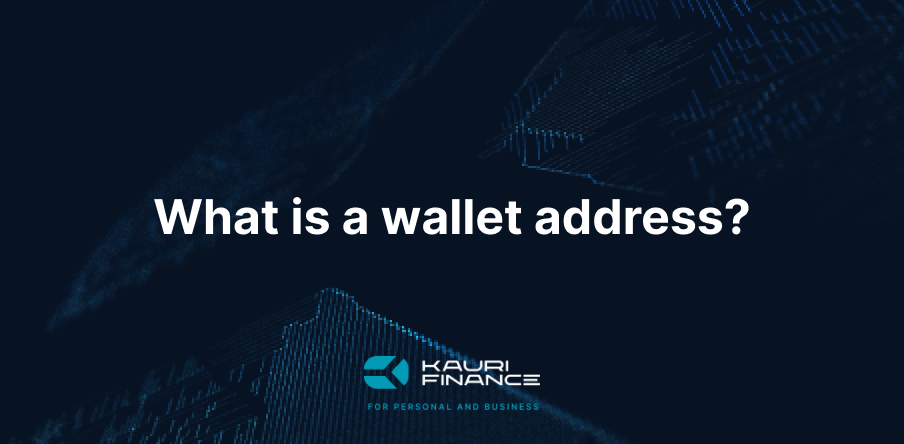
What is a Wallet Address? Understanding the Basics of Crypto Transactions
- The Fundamentals of Cryptocurrency Wallet Addresses
- How Wallet Addresses Work in Blockchain Technology
- Types of Wallet Addresses: From Bitcoin to Ethereum and Beyond
- Best Practices for Managing Your Crypto Wallet Address
- The Future of Wallet Addresses: Innovations and Trends
- Getting Started with Your First Wallet Address
- Frequently Asked Questions About Crypto Wallet Addresses
- What happens if I send crypto to the wrong wallet address?
- Can I change my wallet address?
- Are wallet addresses traceable?
- How many wallet addresses can I have?
- What's the difference between a custodial and non-custodial wallet address?

The Fundamentals of Cryptocurrency Wallet Addresses
Envision a digital passport unlocking the vast realm of cryptocurrency. That's precisely what a wallet address represents in the crypto ecosystem. Unlike traditional bank accounts, these self-generated cryptographic identifiers offer unparalleled financial autonomy. Each address, a unique alphanumeric string, serves as both your identity and destination for receiving digital assets on the blockchain.
While bank accounts are centralized, wallet addresses operate on decentralized networks, enabling peer-to-peer transactions without intermediaries. This shift empowers users with direct asset control, eliminating institutional oversight. The beauty of wallet addresses lies in their ability to facilitate seamless cross-border value transfer, revolutionizing global finance.
Now that we understand the basics, let's explore how wallet addresses work within the intricate world of blockchain technology.
How Wallet Addresses Work in Blockchain Technology
Wallet addresses, the digital fingerprints of blockchain, operate through asymmetric cryptography. Public and private keys form a secure pair, with the public key generating the unique, visible address on the blockchain.
This system ensures transaction integrity through digital signatures. The sender's private key signs the transaction, creating unforgeable proof of ownership. Network nodes verify this signature against the public key, confirming legitimacy without exposing the private key.
-
Public key: Shareable address for receiving funds
-
Private key: Secret code for authorizing transactions
-
Digital signature: Cryptographic proof of authenticity
-
Decentralized validation: Each node independently verifies transactions
This robust system underpins trustless, peer-to-peer cryptocurrency exchanges, revolutionizing digital asset transfer.
With a grasp on how wallet addresses function in blockchain, let's examine the various types of addresses across different cryptocurrencies.
Types of Wallet Addresses: From Bitcoin to Ethereum and Beyond
Delving into the diverse realm of cryptocurrency wallet addresses unveils a tapestry of innovation. Bitcoin, the pioneer, employs Base58Check encoding, yielding addresses beginning with "1" or "3". Ethereum adopts a hexadecimal format, prefixed with "0x", while Ripple's addresses start with "r". Cardano utilizes Bech32 encoding, initiating with "addr1".
|
Cryptocurrency |
Address Format |
Unique Feature |
|
Bitcoin |
Base58Check |
Legacy and SegWit support |
|
Ethereum |
Hexadecimal |
Smart contract compatibility |
|
Ripple |
Base58 |
Destination tags for exchanges |
|
Cardano |
Bech32 |
Stake address integration |
Each format balances security, usability, and network-specific functionality, shaping the future of digital asset management. As of 2024, Ethereum's addresses facilitate over 1 million daily transactions, showcasing the growing importance of diverse address types in the crypto ecosystem.
Understanding the different types of wallet addresses is crucial, but knowing how to manage them safely is equally important. Let's explore best practices for securing your digital assets.
Best Practices for Managing Your Crypto Wallet Address
Safeguarding your crypto wallet address is paramount in the digital asset realm. As Michael Saylor emphasizes, "Your keys, your coins; not your keys, not your coins." This mantra underscores personal responsibility in managing digital wealth. Employ hardware wallets for cold storage, keeping private keys offline and impervious to remote hacks. For hot wallets, use reputable providers with robust security measures, including two-factor authentication and biometric verification.
In the cryptosphere, vigilance is your strongest asset, and complacency your greatest vulnerability. By 2024, over 80% of crypto thefts resulted from poor security practices.
Always double-check recipient addresses before transactions, as blockchain transfers are irreversible. Beware of clipboard hijacking malware. Regularly update software to patch vulnerabilities. Consider multisig wallets for high-value holdings, requiring multiple approvals for added security.
As we look towards securing our wallet addresses, it's exciting to consider what innovations lie ahead in this rapidly evolving field.
The Future of Wallet Addresses: Innovations and Trends
The future of wallet addresses heralds a revolution in user experience and interoperability. Human-readable formats, like "john.doe@ethereum," are poised to simplify transactions and reduce errors. Cross-chain compatibility promises seamless asset transfer between blockchains, potentially unifying the DeFi ecosystem. Quantum-resistant cryptography is emerging to safeguard against future computational threats, while biometric integration may soon enable authentication via fingerprints or retinal scans. As blockchain adoption grows, wallet addresses could become integral to digital identity systems, streamlining KYC processes and online interactions. By 2026, experts predict over 1 billion global crypto users, highlighting the importance of these innovations in shaping the future of digital finance.
With an eye on the future, let's walk through the practical steps of obtaining and using your first wallet address.
Getting Started with Your First Wallet Address
Embark on your crypto journey by securing a wallet address:
-
Choose a reputable provider (e.g., Trust Wallet, MetaMask)
-
Download and install the app
-
Create a wallet, safeguarding your seed phrase
-
Locate your public address
-
Test with a small transaction
-
Enable 2FA for added security
Your wallet address is your gateway to decentralized finance. Handle it with care and confidentiality.
Now that you're equipped with knowledge about wallet addresses, let's address some common questions that often arise for both newcomers and experienced users.
Frequently Asked Questions About Crypto Wallet Addresses
What happens if I send crypto to the wrong wallet address?
Sending crypto to an incorrect address is irreversible. Funds become permanently lost in the blockchain. Always double-check recipient addresses before confirming transactions. Verify through multiple channels to prevent costly mistakes in decentralized finance. This critical step safeguards your digital assets.
Can I change my wallet address?
Can I change my wallet address?
While wallet addresses are immutable, you can generate new ones within your wallet. This enhances privacy and organizes funds. Each address links to your wallet, allowing management of multiple entry points for digital assets while maintaining a unified overview of holdings.
Are wallet addresses traceable?
Public blockchains inherently trace wallet addresses, recording every transaction. While linking addresses to real-world identities requires additional data, forensic tools and KYC practices can deanonymize users. Privacy coins and mixing services offer increased anonymity for those seeking it.
How many wallet addresses can I have?
How many wallet addresses can I have?
Cryptocurrency offers limitless address creation, enhancing privacy and asset management. HD technology in modern wallets generates unique addresses per transaction, bolstering security. This flexibility allows users to organize transactions, protect anonymity, and tailor strategies in the evolving crypto landscape.
What's the difference between a custodial and non-custodial wallet address?
Custodial wallets entrust private keys to third parties, offering convenience at the cost of control. Non-custodial wallets empower users with full key ownership, enhancing security but demanding greater responsibility. In 2024, 65% of crypto users prefer non-custodial solutions, prioritizing autonomy in the evolving DeFi landscape.
